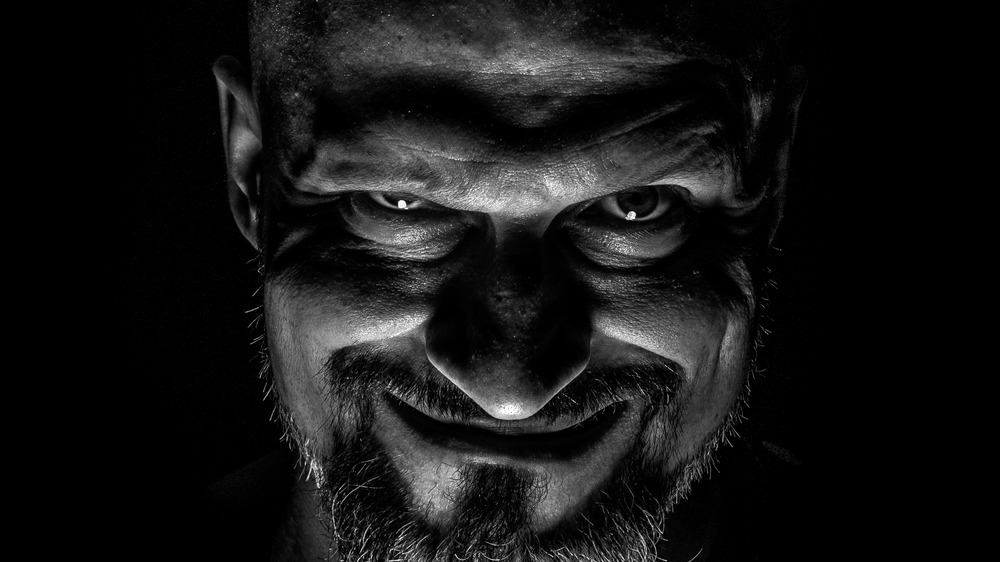Evil People Share A 'Dark Factor,' According To Scientists
True evil is a terrifying concept. Monsters hiding in the dark, demons afflicting the faithful, the bloodlust of the cursed terrorizing small fantastical villages that mirror medieval Europe, but evil like that is easy to brush off. It's the human evil that shakes us to our core and, at some level, fascinates the psyche most of all. Murderers walk the streets at every corner of the Earth. Serial killers have become a cathartic exposé for the amateur sleuth. We experience evil every day of our lives in varying degrees, from characters in the movies we watch and the books we read to that one coworker who's been stealing our food from the communal refrigerator for weeks on end. Researchers and philosophers alike have proposed for years that all of these human evils come from the same set of traits that live deep in the darkest of minds, but even that's being redefined.
Classically, evil people are said to share a dark trio of traits known as "the dark triad," but scientists at the University of Copenhagen believe they actually share a lot more than that, and they all stem from the same root. Even the classical dark triad fits into what scientists call "The Dark Factor of Personality."
The dark triad explained
The original dark triad of evil traits consists of narcissism, Machiavellianism, and psychopathy, according to Psychology Today. These traits all have some overlap, but they also have their own unique qualities. People with narcissistic qualities tend to believe and act as if they're better than everyone else. This serves as a means of justification for evil deeds. They believe themselves to be smarter, they're better, they're more qualified, they hold all the right answers, and most of all, they're special. Whatever a narcissist does, they do it because the rules shouldn't apply to them.
The next trait up is Machiavellianism. It's a long word but a reasonably simple trait that can be summarized as "the ends justify the means." Who cares if the route you take is evil, as long as you accomplish the goal?
Then there's psychopathy — in short, a lack of empathy or remorse. It's a defect of the mind that allows people to do evil things because they don't feel bad about it.
If you put all three traits together, you create a dangerous person that none of us want sharing our society. The dark triad can allow an individual to commit heinous acts for personal goals without ever having to take others' feelings into consideration. And, this type of "evil" person isn't going to feel guilty about it.
The D-factor expands and simplifies the triad
As Neuroscience News explains, the dark side of human nature is comprised of more than three qualities. Egoism, sadism, spitefulness, and other traits accompany the dark triad to create a core from which human malevolence is born. This is the essence of the Dark Factor.
The researchers at the University of Copenhagen suggest, through both theoretical and empirical studies, according to the study's documentation, that all of the malevolent human qualities are part of a core that drives "evil" people to commit self-serving acts and sabotage others. Since all of these dark tendencies, as they argue, come from the same theoretically fluid attribute, having one aspect of the dark triad makes you more likely to exhibit the other traits. Basically, if you do one type of bad thing, you probably do other types of bad things because they're all part of a single sort of "badness."
The conclusion, as Bustle explains, is partially derived from the "general intelligence factor," which theorizes that intelligent people who do well with one specific mental task are much more likely than their less intelligent counterparts to do well on other cognitive tasks. The Dark Factor of Personality is the same concept, but applied to the darkness that lurks inside the evil mind.
The D-factor isn't necessarily unique to evil people
After reading the first part of this article, you probably think you're spotting some of these traits within yourself, and that's totally normal. Everyone exhibits undesirable traits from time to time. Thinking you're the best now and then doesn't necessarily mean you're a narcissist. Feeling spiteful when someone crosses you or harms you doesn't mean you're doomed to the far circles of Hell. The D-factor is a part of the concept of personality in general, a spectrum of sorts that can be high, low, or hover in a psychologically gray area.
The theoretical D-factor is only a problem if it's high. As Scientific American explains, a high D-factor would mean an individual is regularly engaging in "ethically, morally, and socially questionable behavior." If you're not committing evil acts on a daily basis, you're probably not an evil person. (You may be a bit of a jerk, but you're probably not outright evil.) What does having a high D-factor look like?
What it means to have a high D factor
There's no uniform description that predicts exactly how those with high D-factor will behave, but the University of Copenhagen study suggests a few key components you can find in these individuals' personalities. The study describes the D-factor as "the general tendency to maximize one's individual utility — disregarding, accepting, or malevolently provoking disutility for others — accompanied by beliefs that serve as justifications." Let's break that down.
The study splits the dark component into three parts, while retaining the component itself as a singular part of the personality. First, "maximizing one's individual utility" basically means they do things for their own gain. "Disregarding, accepting, or malevolently provoking disutility for others" says while they do things for their own gain, they do it regardless of how it negatively affects others or, sometimes, to intentionally effect others in a negative way. And finally, those people with a high D factor hold core beliefs that justify anything they choose to do.
These individuals may actively commit harm by cheating in relationships or committing fraud. They might passively allow harm by not warning you that a burglar is breaking into your house. They might orchestrate an elaborate chain of events that leads to your spouse kicking you out on the street. They might even cause the deaths of other people. High D factor can take on many evil forms.




